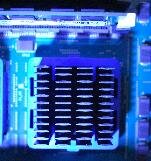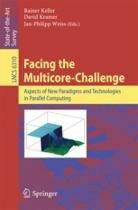
|
Conference for Young Scientists Facing the Multicore-Challenge III September 19 - 21, 2012 Hochschule für Technik Stuttgart University of Applied Sciences |
 |
Conference theme
The trend for increased compute capability and more diverse hardware with its evermore complex topologies continues: In recent systems parallelism spreads over several levels of the system and heterogeneity is growing on the node as well as on the chip level. Data is kept across a nested hierarchy of memory stages and data locality becomes even more important. Most applications and algorithms are not yet ready to utilize available capabilities and a tremendous effort is required to close the gap. Different technologies and processing models, non-adjusted interfaces, and incomplete tool chains complicate holistic programming approaches and impede programmer’s productivity. On the other hand, resource contention, data conflicts and hardware bottlenecks keep performance away from theoretical peak. At the current state of the art in technologies and methodologies an interdisciplinary approach is required to tackle the obstacles in manycore computing. Only a comprehensive approach with contributions from computer science, applied mathematics, high performance computing, and engineering disciplines can face the multicore challenge. Compute- and memory-intensive applications can only benefit from the full hardware potential if all features on all system levels are taken into account in a holistic approach.
This conference is the 3rd in a series, starting in 2010 in Heidelberg at the Heidelberg Academy of Sciences (HAW) and 2011 at the Karlsruhe Institute of Technology (KIT) and the Engineering Mathematics and Computing Lab (EMCL). It aims to combine new aspects of multi-/manycore microprocessor technologies, parallel applications, numerical simulation, software development and tools. Contributions are welcome from all participating disciplines. Particular emphasis is placed on the support and advancement of young scientists.
Submission topics
Topics of interest for conference submissions include (but are not limited to):
-
Emerging hardware architectures (Manycore, multicore-CPUs, GPGPUs, APUs, FPGAs, Cell, tiled manycore architectures, accelerators, ...)
- Aspects of microprocessor technologies and prospect of manycore technologies
- Parallel programming models, environments and languages (MPI, OpenMP, CUDA, OpenCL, PGAS, OpenACC, ...) for multicore computing
-
Hardware-aware computing and architecture-aware approaches for parallel numerical simulations, implementation and algorithm design
-
Heterogeneous computing, adaptive and reconfigurable computing
- Mathematical modeling, design of parallel algorithms and scalability issues
- Parallelization strategies in hybrid and hierarchical setups
- Autotuning strategies; portability and flexibility of software solutions
-
Library and tool support for parallel applications
- Performance analysis and modeling
- Novel programming tools for parallel programming
-
Compiler techniques and code optimization strategies for parallel systems
- Virtualization strategies and hardware transparency
-
Memory behavior analysis, parallel data access and parallel data structures
-
Efficient parallel numerical methods
- Parallel applications (e.g. numerical simulation, image processing)
- Parallelism for nun-numerical and non-HPC applications
-
Practice and experience of multicore programming
-
Benchmarking results of scientific applications, multicore application studies
- Interdisciplinary approaches and theoretical concepts
Conference language is English.
Invited Speakers and Tutorials
The conference will be complemented by invited speakers. It further hosts tutorials on multicore technologies and parallel programming aspects.
Short Talks and Poster Session
The conference program is complemented by poster sessions and short talks of young scientists on ongoing research.
Third Conference: Facing the Multicore-Challenge III
After fruitful conferences at the Heidelberg Academy of Sciences in 2010, at Karlsruhe Institute of Technology (KIT) in 2011, and the multitude of open topics, the third conference, Facing the Multicore-Challenge III, will take place at the Hochschule für Technik, Stuttgart, Germany, September 19-21, 2012.
Questions or Comments
In case of any questions, please contact the organizers by sending your request to .